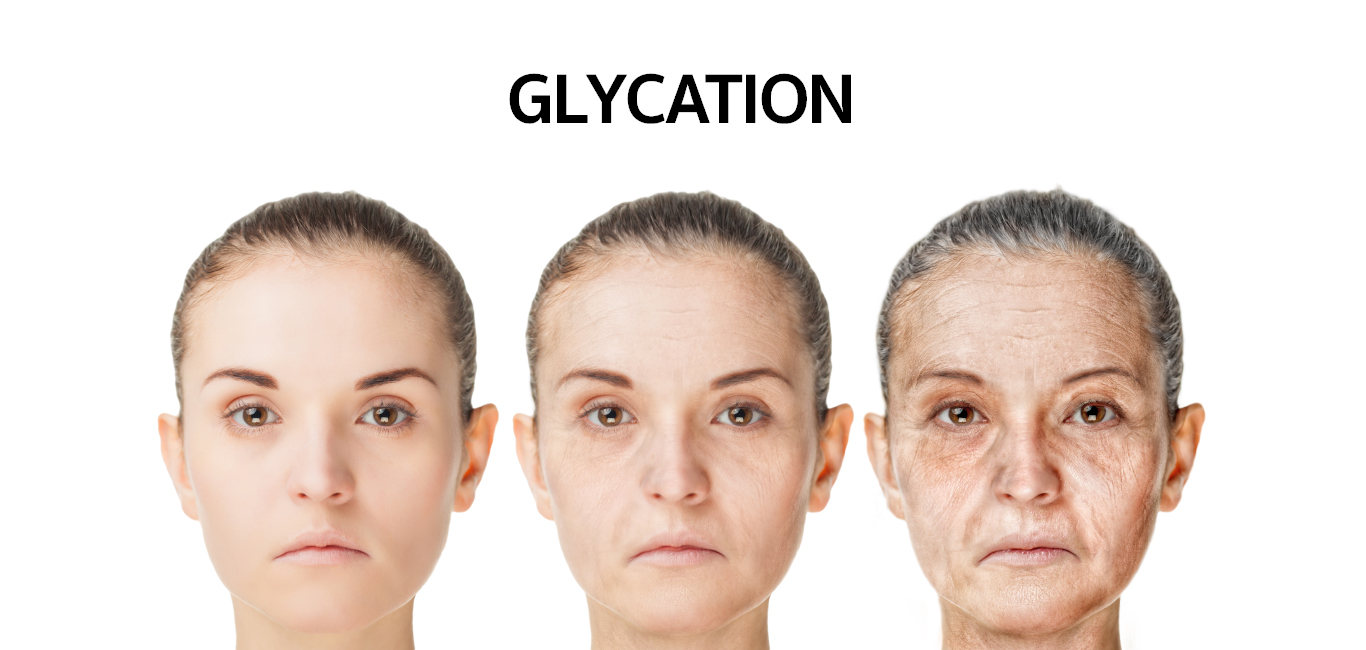
Skin ageing is a natural process that unfolds over time, leaving its trace on our faces. While one accepts the natural signs of ageing skin, it is often possible to trigger faster ageing through stress, sunlight exposure or even that extra piece of cupcake. Yes, we mean sugar. It is well-known that sugar is detrimental to our skin and overall health— yet one ponders the true extent of its effect on one’s body. As we go through this packed piece, we will know what sugar does to our bodies, how it influences ageing and what we can do about it.
What is skin glycation?
“Glycation is a natural process that occurs in the body when excess sugar molecules bind to proteins or lipids without the control of enzymes,” says Dr Rosmy Barrios, head of the anti-ageing department, and regenerative medicine specialist at Belgrade clinic. When the blood sugar levels are elevated either due to intake of high-sugar foods or through metabolic processes such as diabetes, it forms advanced glycation end products (AGEs).
AGEs: advanced glycation, age acceleration
“AGEs can accumulate in various tissues throughout the body, including the skin,” says Dr Barrios. This process occurs naturally in the body as part of normal metabolism. “However, it can be accelerated by external factors such as high-sugar diets, smoking, and radiation exposure,” says Dr Harikiran Chekuri, dermatologist and cosmetologist.
AGEs are problematic because the body’s self-repair capabilities decline with age. This can lead them to accumulate over time.
How does glycation affect cellular function?
Experts say the accumulation of AGEs in the body can lead to several age-related dysfunctions, such as oxidative stress, inflammation, and impaired protein and tissue function.
Oxidative stress: Oxidative stress occurs when there is an imbalance between harmful free radicals and antioxidants in the body, leading to cell damage. This damage can affect healthy proteins, lipids, and DNA strands, impairing their normal functioning and accelerating ageing.
Inflammation: The accumulation of AGEs can activate the immune system and promote the release of inflammatory mediators. It is also linked to several age-related diseases such as Alzheimer’s disease and cardiovascular conditions. When AGEs form in the body they create cytokines which trigger an inflammatory response, resulting in chronic inflammation— one of the primary causes of ageing.
Alter the protein structure: AGEs can crosslink with proteins and impair their structure and function. In the skin, this can lead to the formation of wrinkles, reduced elasticity, and a dull appearance.
Link with other diseases: It has also been linked to conditions such as cataracts, diabetes, osteoporosis and even some forms of cancer.
Causes
“When AGEs form within our cells it affects collagen production and elastin which is essential for maintaining the skin’s firmness and flexibility,” says Dr Chekuri. The breakdown of these components leaves the skin susceptible to wrinkles, age spots and other signs of ageing. A 2017 study published in the National Library of Medicine by researcher Chan-Sik Kim revealed that AGEs affect extracellular matrix elasticity (outside the skin cells), and intracellular protein function, and triggers inflammatory signalling pathways. This interaction causes faster skin ageing.
Experts provide tips on lifestyle modifications to help reduce glycation and slow down the ageing process:
Follow a balanced diet: Choose foods with a low glycaemic index such as whole grains, legumes, vegetables, and fruits, as they are digested more slowly, resulting in a gradual release of glucose into the bloodstream. Additionally, foods rich in antioxidants, such as berries, leafy greens, and nuts, can help counteract oxidative stress.
Limit sugar intake: Avoid foods that are high in refined sugar and processed carbohydrates like sugary foods, processed foods, and beverages. Be mindful of hidden sugars in packaged foods and opt for healthier alternatives. The study by Kim also revealed that eating healthy foods and reducing processed foods reduces the contribution of AGEs significantly.
Opt for healthy cooking methods: Instead of frying or grilling at high temperatures, consider steaming, boiling, or baking foods. These cooking methods produce fewer AGEs.
Exercise regularly: Engage in physical activity, as it can help regulate blood sugar levels and reduce oxidative stress. Regular exercise also promotes overall well-being and can help achieve a healthy skin.
Protect your skin from UV radiation: Exposure to UV rays accelerates skin ageing. Use sunscreen, wear protective clothing, and limit sun exposure, especially during peak hours.
Stay hydrated: Drink plenty of water throughout the day as water promotes detoxification of cells and help neutralise harmful free radicals.
Limit alcohol consumption: Alcohol increases blood sugar levels if consumed in excess and can promote skin glycation.

















